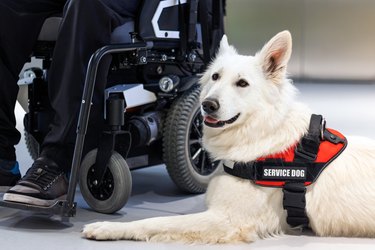There are important distinctions between service dogs, emotional support dogs, and therapy dogs. While each of these categories contains animals that serve an invaluable service of one type or another, it's vital to know the differences between therapy, emotional support, and service.

Video of the Day
What is a service dog?
A service dog is specifically trained to provide one human with a specific service or perform a specific task. Special training for service animals can take up to a full year before they're given to the person with special needs or disabilities. A service dog must be completely comfortable in any environment and situation. Many in the field refer to this as being "bomb proof". This means, that if a bomb went off they would still be able to provide the service to their person — while remaining calm and focused.
Video of the Day
Service dogs are legally allowed to accompany the person they're trained for anywhere, including places where pets aren't allowed. It's up to the place you're entering whether they ask for proof, which might consist of a certificate from the ADA and potentially asking what service the dog provides if it's not immediately apparent. However, as part of the Americans with Disabilities Act, people are never allowed to ask what anyone's disability is. A vest or ID is not required, though it's fairly common to see among these dogs. They also might have a special type of lead depending on the service provided.
Types of service dogs
They don't just act as leaders for the blind or wheelchair bound. Many service dogs also perform as alerters. Alerters include those who help indicate danger to deaf people, or to diabetics when their sugar levels are off. This prevents serious complications and even death. They can also signal their person before a seizure happens and then stay with them for the duration. Or they are able to alert someone with a mental illness that it's time to take their medication or when they might have an episode of sorts. Others act as psychiatric service dogs by providing alerts and comfort to people with post-traumatic stress disorder (PTSD) or other serious mood disabilities and disorders.
Some dogs act almost as a personal assistant to people with various disabilities. If someone who's wheelchair bound can't bend over to pick up something they've just dropped, their service dog sure can. Another helpful type is the service dog that acts as a stand for someone to lean on. These dogs can be helpful to those with conditions like cerebral palsy or even epilepsy.

What is an Emotional Support Dog
The emotional support dog's therapeutic benefits are incredibly important, but this does not make them a service dog. The biggest distinction is that rather than providing a specific service for one particular person, they give comfort and relief to those with anxiety, depression, mood disorders, phobias, and even loneliness. Although the requirements for training are less strict than those of a service dog, it's still very important for these dogs to be well trained.
Emotional support dogs have fewer legal rights and protections than service dogs. The Fair Housing Act requires buildings to make reasonable accommodations for anyone with proof that their animal is an emotional support animal. Though airlines are no longer required to accommodate these animals for air travel. The proof needed in the case of an emotional support dog is typically a letter from a mental health professional. The letter should state that the dog has been prescribed for a diagnosed psychiatric and/or emotional disorder.
With fraudulent past claims, this process has become somewhat more rigid in some cases. Many doctors will even require that your dog pass a behavioral exam through an animal behaviorist ensuring that the dog can remain calm and provide the proper support for their person. This is often done before they'll sign off on the proper paperwork.

What are Therapy Dogs?
Therapy dogs are trained to help many people, rather than a specific handler with a specific need. These dogs pop up as volunteers performing a number of tasks that range from bringing smiles to patients' faces at hospitals, nursing homes, and hospices, to calming weary travelers at airports.
It's important for therapy dogs to have calm temperaments and be at home in many environments and with all people. They also need to remain unfazed by sounds and movements. Therapy dogs also need to be comfortable with being handled by all sorts of people with varying needs, appearances, and energies.
If you think your dog would be a great therapy dog, there are schools and trainers that offer programs providing you with proper certification. These certifications are typically required depending on the institution where you're planning on volunteering.

In summary
The distinctions between service, emotional support, and therapy dogs are important if you ever need to claim one of these categories for your pet. You never want to misrepresent an animal or yourself. Doing so is illegal. It can also make an already difficult world even more so for those with special needs and the dogs that accommodate them. The amount of misrepresentation of poorly trained pets, including some exotics, being passed off as emotional support animals, on flights — has led to laws no longer requiring airlines to accommodate them. This results in difficulty for those with legitimate emotional support animals, as they're no longer guaranteed accommodations. Making sure your dog is properly categorized protects you and everyone else.